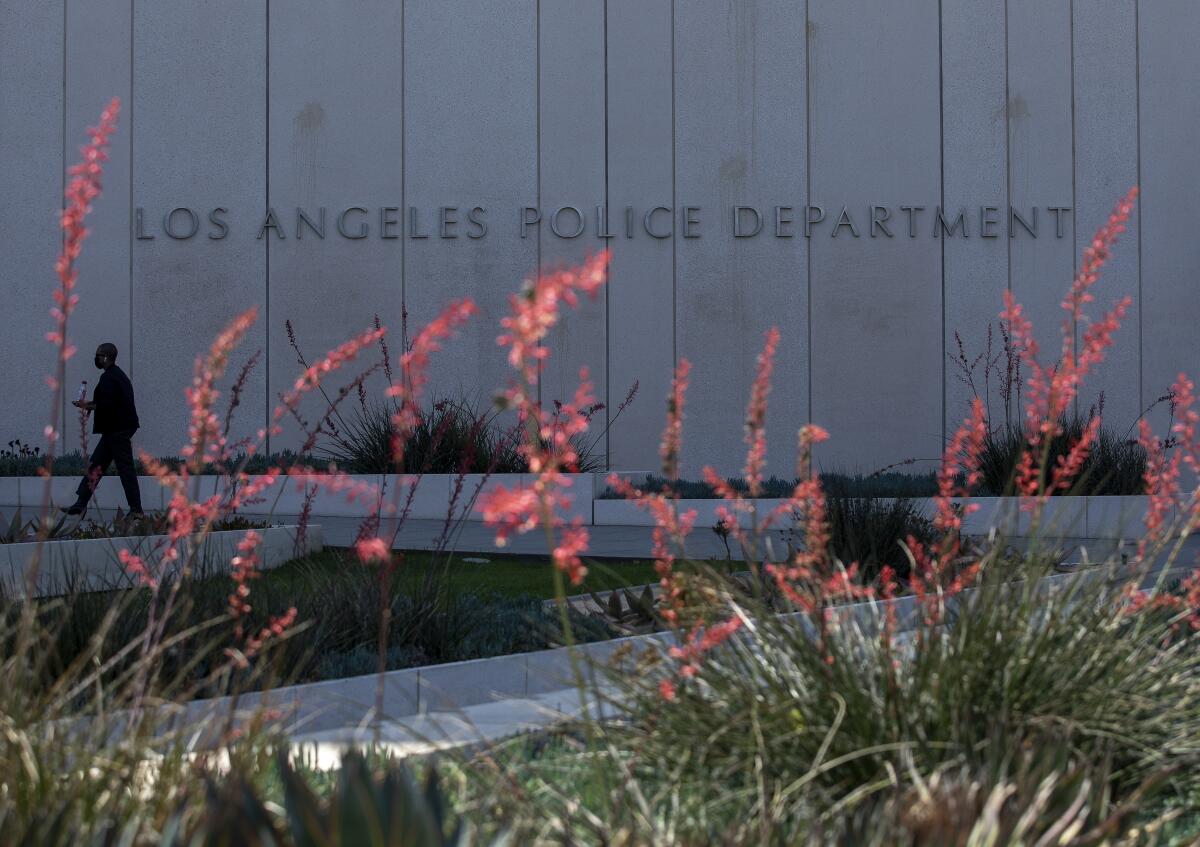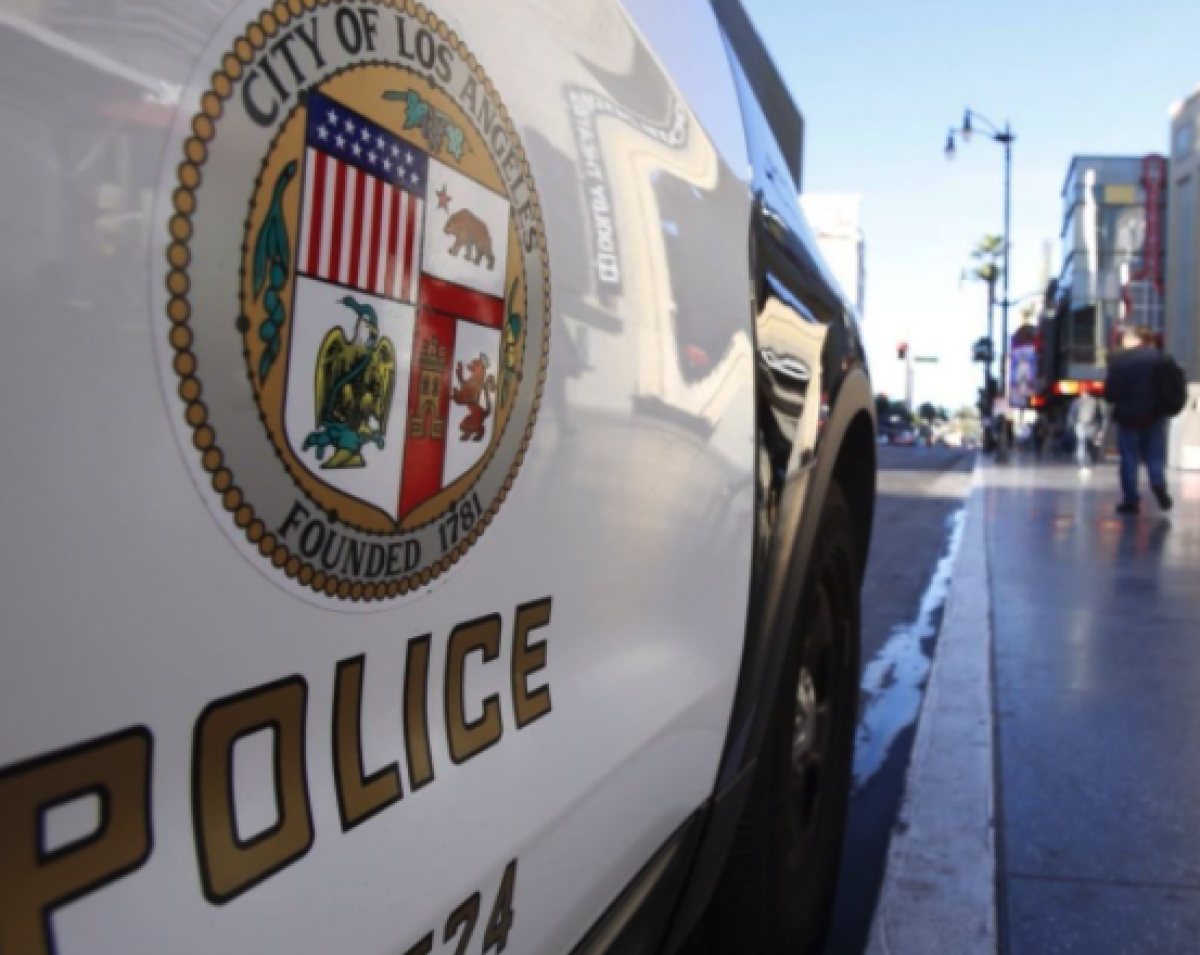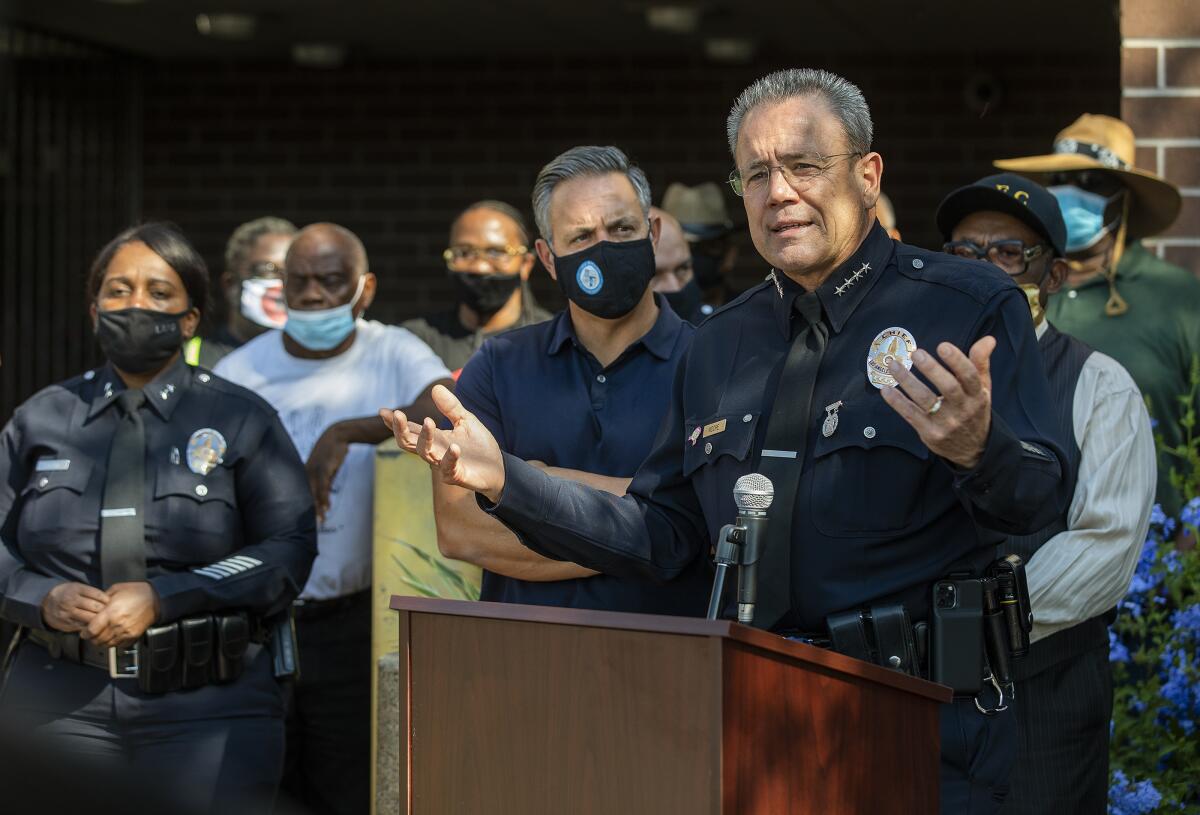Armed and drunk: Off-duty cops get into trouble drinking. LAPD rules fail to prevent it

- Share via
Early one morning last month, off-duty Los Angeles Police Officer Nicolas Quintanilla-Borja allegedly threatened to kill his cousin and another man with a handgun in Inglewood before being arrested by local police, prosecutors said.
Days later, LAPD Chief Michel Moore told the civilian Police Commission that the incident troubled him “a great deal,” in part because Quintanilla-Borja — a probationary officer with less than 18 months on the force — was allegedly “significantly” impaired by alcohol at the time.
Moore said that he immediately assigned Quintanilla-Borja to home and removed his police powers, and that the LAPD is “taking additional actions” he could not discuss. Quintanilla-Borja, who could not be reached for comment, has pleaded not guilty to multiple charges, including assault with a semiautomatic weapon.
Los Angeles County Dist. Atty. George Gascón said Quintanilla-Borja would not get special treatment. “Wearing a badge does not give an officer the right to break laws,” he said.
Inglewood officers responded to a radio call about a family disturbance and arrested the 29-year-old after interviewing victims and witnesses at the scene.
The LAPD has been struggling for years with how to deal with alcohol use by armed, off-duty officers, failing to develop clear policies despite a series of problems, The Times found. Other departments across the country have robust rules for carrying firearms while drinking alcohol or when intoxicated, but the LAPD’s rules remain vague even as serious cases pile up.
In a 2019 incident that resurfaced in state court in April, an LAPD detective who’d been drinking with subordinates for hours in downtown bars allegedly shot a homeless man on skid row before being badly beaten himself. The officer claimed self-defense.
In a 2020 case reviewed by the Police Commission in April, an LAPD officer who’d been drinking whiskey and beer while shooting targets with two fellow cops at a remote Apple Valley campsite imagined they were under attack and allegedly shot one of his friends. He later claimed the shooting was a result of his post-traumatic stress disorder, not the alcohol.
The misuse of alcohol by officers has long been identified as a problem in law enforcement across the country. Police work can be stressful, officers have been found in studies to abuse alcohol at higher rates than the general public, and they are often armed, even when off duty, through special rights afforded to them as peace officers.
In response to questions about the recent cases, the LAPD confirmed it “does not have a specific policy relating to the off-duty consumption of alcohol in conjunction with the carrying of a firearm,” but said other policies requiring officers to act appropriately are sufficient for holding them accountable.
Capt. Stacy Spell, a department spokesman, said officers are made aware of policies that preclude their acting in “unbecoming” ways, including with alcohol, during recruit training, during roll call briefings and through “a larger alcohol awareness campaign that occurs each April.”
Department leaders “have and will hold our personnel accountable should they misuse alcohol and cannot exercise reasonable care and/or control of a firearm,” Spell said.
Still, the LAPD’s lack of an explicit policy — one that not only punishes armed off-duty officers who get intoxicated and into trouble, but precludes them from carrying their weapons while intoxicated in the first place — puts it at odds with other law enforcement agencies in the region and country.
It also distinguishes the LAPD’s policy from a federal law allowing officers to carry weapons interstate, which says they must not be under the influence of alcohol while doing so, and with California’s concealed carry law for civilians, which bars licensees from consuming “any alcoholic beverage” while carrying a firearm.
A LAPD detective who avoided being fired for shooting a man on skid row after a night of drinking in 2019 is challenging the suspension he received.
When asked about police officers carrying concealed weapons, the California attorney general’s office said that cops aren’t subject to the restrictions on civilian licensees, but that each of the state’s individual law enforcement agencies “likely has a departmental policy that addresses the consumption of alcohol.”
That is true for some agencies, but not the LAPD.
Off-duty sheriff’s deputies for Los Angeles and Orange counties are explicitly barred from carrying weapons while under the influence of alcohol. Officers in San Francisco, by policy, “shall not consume alcoholic beverages or be impaired” while armed, with the department defining “impaired” as having a diminished ability to perform one’s duties or a blood-alcohol content of more than 0.015%.
Similar policies exist in big departments beyond California, as well.
In the Houston Police Department, officers are restricted from carrying a firearm if they have any measurable amount of alcohol in their body. In the Chicago Police Department, off-duty officers can carry firearms but “are instructed to refrain from doing so when there is a likelihood that they will be consuming alcoholic beverages or medications that may impair their physical and/or mental abilities.”
In the New York Police Department, off-duty officers “are to be unarmed at their own discretion when engaged in any activity of a nature whereby it would be advisable not to carry a firearm, especially those events at which alcoholic beverages are consumed.”

In addition, every NYPD officer involved in an on- or off-duty shooting must submit to an alcohol test, and will be found in violation of policy if they have a blood-alcohol content above 0.08% — a rule implemented after undercover officers drank alcohol and then fatally shot a Queens man, on the morning of his wedding, during a confrontation outside a club.
LAPD officers who shoot people, either on duty or off, are not automatically tested for alcohol, but can be if “cause exists” to believe they are under the influence of alcohol, the department said.
Off-duty officers can be punished for acting in “unbecoming” ways while drinking alcohol, whether they are armed or not. The recommended punishment ranges from a simple reprimand to a suspension of up to 22 days and demotion for a first offense, and increases to possible termination for a second offense.
The department’s penalty guide does not provide distinct recommendations based on whether the offending officer is armed, though it recommends the same penalties for on-duty officers caught drinking at work, when they would presumably be armed.
Off-duty LAPD officers regularly consume alcohol while armed, often without any trouble. Other times, they run into serious problems. Quarterly misconduct reports from past years show that officers have been arrested for drunk driving, domestic violence and public intoxication. The reports don’t indicate whether each officer was armed, but some allegedly were.
An off-duty officer who got arrested in 2013 after allegedly firing an LAPD- issued handgun and driving under the influence of alcohol received a 22-day suspension for the incident in 2015. Another officer received a five-day suspension for being drunk in public and failing to carry an LAPD- issued firearm “in a Department approved manner” — an apparent reference to holstering rules.
In the 2019 skid row shooting, investigators determined Det. Michael Johnson’s blood-alcohol content was 0.329%, which is more than four times the legal limit to drive a car in California, after he was found badly beaten on the street.
Johnson alleged that the homeless man he shot pulled a gun first and that he acted in self-defense, though he also said he could not remember certain aspects of the encounter. The homeless man alleged Johnson had been aggressive with a woman, grabbing her by the arm, before he interceded.

Moore wanted to fire Johnson, but the detective was instead given a 55-day unpaid suspension. In April, Johnson filed a lawsuit in state court challenging that punishment as excessive.
In a report to the Police Commission, Moore said an internal review board had expressed concern about Johnson’s “decision to consume large amounts of alcohol while being armed,” and found Johnson “should have known it was not a good decision” given his tenure as a supervisor.
But Moore also noted that “there is no policy that designates an amount of alcohol that may be consumed while off duty.” Prosecutors said in April that they were still reviewing the case.
In the 2020 campsite shooting, Officer Ismael Tamayo’s attorney argued in a San Bernardino County court that Tamayo had experienced a dissociative episode tied to post-traumatic stress disorder from his time serving in the military, and a judge placed Tamayo into a diversion program for defendants with mental disorders.
But in their own review, LAPD investigators focused on Tamayo’s alcohol consumption, noting he still had a blood-alcohol content of 0.085% — above the state’s 0.08% driving limit — about nine hours after the shooting.
In his report to the Police Commission, Moore expressed concerns about Tamayo’s decision to maintain a gun on his hip as he drank, and said a review board “emphasized that officers should abstain from consuming alcohol while maintaining control of firearms.”
However, not everyone agrees that officers should be restricted in such a way. The union that represents rank-and-file LAPD officers, for example, said it opposed any such restrictions.
Off-duty officers are afforded the right to carry firearms “so that they can protect themselves and the public if a dangerous situation arises,” and are already expected to do so responsibly and in compliance with department policies, the Los Angeles Police Protective League’s board of directors said.
“The reality is, whether on or off duty, LAPD officers are held to our Department’s high standards of conduct that are among the most stringent in the nation.”
Similar arguments were made by the union that represents L.A. County deputies before that department adopted its policy barring deputies from carrying firearms while drunk a decade ago.
In 2006, a deputy and Marine Corps reservist named Chris Sullivan was charged with voluntary manslaughter in the fatal shooting of his friend and fellow reservist Cesar Valdez after the pair went out drinking to celebrate Sullivan’s return home from a tour of duty in Iraq.
Sullivan, whom investigators alleged had consumed at least 11 drinks, said he and Valdez had been horsing around and that his gun fired accidentally. He was later acquitted of the manslaughter charge.
Still, the incident sparked a years-long debate around deputies drinking while armed, with then-Sheriff Lee Baca promising to implement a policy to prevent similar incidents.
“Alcohol and guns don’t mix,” Baca said at the time.
In 2010, against the union’s wishes, the Sheriff’s Department implemented a policy stating that armed off-duty officers “shall not consume any intoxicating substance to the point where the employee is unable to or does not exercise reasonable care and/or control of the firearm.”
The policy says an officer with a blood-alcohol content of 0.08% or more is unable to do so by definition, but may rebut a claim that he violated the policy by showing he acted reasonably.
The policy has not entirely stopped alcohol- and gun-related incidents involving deputies. Between 2011 and 2019, the Sheriff’s Department had 81 internal affairs cases in which a deputy was accused of alcohol and firearms violations, according to a county report.
Still, officials say they believe the policy may have prevented other incidents.
L.A. County Inspector General Max Huntsman said the issue of alcohol use by armed, off-duty law enforcement officers remains “deeply entrenched,” as many officers believe they need protection in case a criminal recognizes and confronts them on the street.
However, he doesn’t think that warrants being drunk and armed, and believes departments should consider policies barring officers from carrying a firearm if they have a blood-alcohol content of 0.02% or higher.
Doing so, he said, would send “a clear message” to officers and the public that “consuming alcohol while carrying a firearm is inherently dangerous and unacceptable.”
More to Read
Sign up for Essential California
The most important California stories and recommendations in your inbox every morning.
You may occasionally receive promotional content from the Los Angeles Times.
















